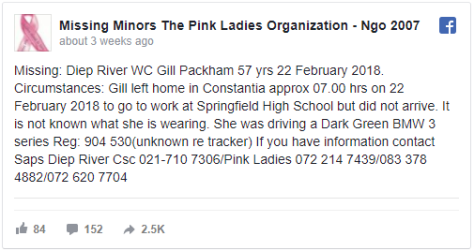Gill Packham, 57-year-old mother of two, was reported missing by a family member late on 22 February after failing to show up for work at Springfield Convent. The Pink Ladies Organisation also put out a missing persons alert for her, and later that evening, a burning car was discovered at Diep River train station with a charred body locked in the boot. On the 27 February, DNA tests confirmed that the remains were Gill’s and her husband Robin Packham was arrested. The State has indicated that it has a strong case against Packham, who was released on bail of R50 000 last Friday.

According to Prosecutor Brynmor Benjamin, the Packham’s were known to be having marital issues and Packham sent Gill a message saying that he was “thinking of calling it a day”. Further evidence against Packham continued to pile up, as police found blood in the Packhams’ garage, main bedroom en suite, and on the driver’s door of the accused’s car. Packham also reportedly (link) tried to get a colleague to say that they were in a meeting the morning that Gill disappeared. However, his cellphone records placed him in Diep River at that time.
Packham stands accused of premeditated murder, defeating the ends of justice, and destroying evidence, and Magistrate Goolam Bawa ordered that he be held at Pollsmoor Prison while the schedule of his alleged offences was determined. After Packham’s bail hearing in the Wynberg Magistrate’s Court last Friday, were he revealed that he intends to plead not guilty, he was released on bail and placed under house arrest for a month.
His attorney Ben Mathewson, argued that the forensics team has not confirmed that the blood found in the Packham’s house matched Gill, and that his client had driven around looking for his missing wife on the day of her disappearance. However, state advocate Susan Galloway told the court that their investigations are incomplete as they are awaiting the results of an outstanding forensics report. The police are still trying to locate Gill’s cellphone and the murder weapon, and the case will be transferred to the Western Cape High Court when it is ready to go to trial.
Gill Packham’s was not the only case of femicide to appear in the Wynberg Magistrate’s Court last Friday. The four men accused of raping and killing Stellenbosch student Hannah Cornelius also appeared in court, were the case was remanded until the 23 March for another pre-trial hearing. This serves as a sobering reminder that murder and violence against women is still incredibly prevalent in society; a fact which South Africans keep forgetting.
Africa Check, an independent fact-checking organisation, and the Violence and Injury Prevention programme of WHO have vetted the statistic that South Africa’s femicide rate is 5 times higher than the global average. They used projected figures to determine that this would currently be closer to 4 times higher, however, in all the years that non-projected data was used, the comparison ranges from 6,4 to 5,1 times higher than the global average. While the statistics for the number of women killed by their intimate partner are still unclear, as it remains a legally undefined crime, the research conducted in this area indicates that at least half of the femicides in South Africa are committed by an intimate partner.
This begs the questions: Is the murder of Gill Packham just the latest in South Africa’s string of femicide headlines? Will her case fade with its sensationalist, shock-tactic grip on the news like Hannah Cornelius’ did? Or will South Africa finally see a decrease in femicide and female abuse?

